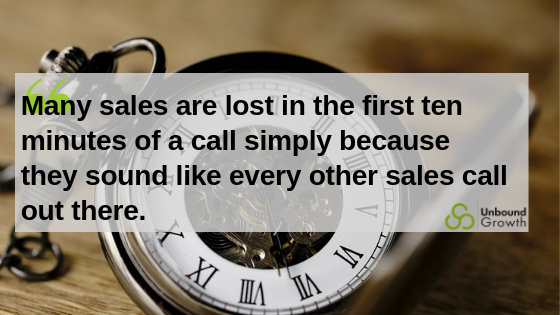
What is the best way to offer feedback without overwhelming your salespeople?
So many recorded calls, but still so little time! With the rising trend of listening to recorded calls, many hoped it meant that salespeople would improve faster and with less time required of sales managers.
How is that working out for ya? I talked with one sales manager who would listen to his teams calls on the way into work, and on the way home- through Boston traffic. If you’ve ever driven in Boston, you can imagine this was a accident just waiting to happen.
And if you think about this realistically, how many of your reps calls do you actually have time to listen to? Let’s assume your sales reps average calls is thirty minutes, and they do three a day and you have ten reps. That’s seventy-five hours of calls to review in a week!
Not gonna happen. Nor should it! Just because you can record all your reps calls, doesn’t mean you can, or should, listen to them all in their entirety. Everyone would be overwhelmed.
Don’t get me wrong, giving your reps feedback on recorded calls should absolutely be part of your regular coaching cadence with your sales teams.
So how do you fit it into your schedule? What calls should you be listening to? What is the best way to offer feedback to reps so they can improve without overwhelming them?
How to fit call recording feedback into your coaching schedule
Focus on one area of improvement at a time
Not everything can be improved on at the same time. Together, with each of your salespeople, determine what areas of the sales process they are most uncomfortable or uncertain about. (You do have a sales process everyone follows right? If you don't, fear not- we have you covered. Here is a worksheet to get everyone on the same page that you can customize.)
The best way to do this and remove the bias of the Dunning-Kruger Effect (which states the less experienced we are, the more we overestimate our abilities) is to have an objective evaluation done of your salespeople based on sales mindsets and skill sets- not personality traits. (Get a high-level view of your teams strengths and weaknesses in 21 sales competencies here for free.)
It is important to collaborate with your salesperson on which area to improve. The more involved they are in their own development process, the more likely they will opt in to it. Your job as a manager is to guide, not dictate.
Once you and your rep have identified the area to improve, focus on only that part of the call. Have your rep tag the moment in the call where to it begins and ends. When you review it, listen to what happens just prior and after those moments to see how they got there, and what the result was.
In fact, make it a policy to have your reps listen to one or two of their own calls a week. Whether you are a Patriots football fan or not, you can’t deny that Tom Brady is one of the greatest quarterbacks of all time. And he watches more of his own game tape than anyone in the league!
Less telling, more asking.
When you give feedback on the call ask them questions like;
- “Why do you think they responded that way?”
- “If you were to ask that question over, how would you phrase it differently?”
- “What other questions do you wish you had asked prior, or after this moment?”
Rehearse their lines with them.
When you sit down in your 1:1 with your rep, work out a new approach based on the questions you asked. That’s right, practice it with them! Role play that part of the call until the new approach becomes their natural response.
What if they don’t know where to start improving?
When you don’t know where to start, start at the beginning. Many sales are lost in the first ten minutes of a call simply because they sound like every other sales call out there. Don’t discount the importance of collaborating with buyers on an agenda they care about prior to getting on the phone.
On the call itself, look at the questions they ask to open the call. Are they all about them, or the product? Are they closed or open-ended? Asking buyers open-ended questions that are all about what they think and want will be more likely to identify gaps and problems to be solved.
If you are using a call recording technology that uses AI to analyze calls, you can tell whether they are asking questions consistently throughout the call, if they are talking too much or too fast, and if there are enough meaningful switches in the conversation to tell if buyers are engaged.
Want to learn more?
For more on how to manage your schedule to spend the majority of your time coaching salespeople, check out the Ideal Schedule for Sales Manager Productivity.






